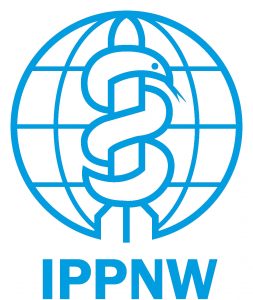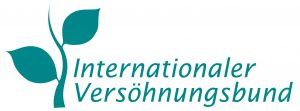On 2 February, ICAN Austria together with the Austrian Red Cross and the Diplomatic Academy Vienna, held a roundtable discussion event „Towards Banning Nuclear Weapons in 2017: Changing the Game in Nuclear Disarmament?“. Prominent experts discussed their expectations about the upcoming negotiation process as well as the overarching impact on international politics.
hier geht’s zum Bericht auf Deutsch.
The event was a great success for the organisers, as 180 guests were welcomed in a room filled to the last seat. The high-level panel attracted a wide range of people, ranging from representatives of Vienna’s diplomatic community to academia, scientists, civil society and students. Additionally, the event was broadcasted live on Facebook.
For the event we developed an interactive format, aimed at exploring new ways of interaction with the audience and creating a challenging setting for the experts on the roundtable. Questions could be submitted and pitched to the moderator throughout the entire discussion, via handwritten notes collected in the audience or through comments submitted on social media by the on-site as well as online audience. The format enabled a vibrant discussion guided and steered by the diverse audience.
Report
Among the various uncertainties that the election of Donald Trump has brought, the fact that he would have his finger on the red button of the world’s largest nuclear arsenal is all too reminiscent of a nightmarish Dr. Strangelove scenario and particularly stands out. Has Trump – before the treaty negotiations even started – changed the game?, asks Fabio Polly to open the discussion.
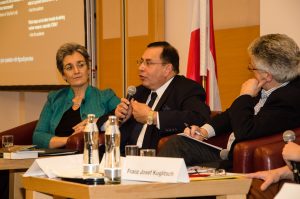
His election brings nuclear weapons back to the forefront of people’s minds and on the top list of states’ concerns, the discussants agree. But nuclear dangers already increased before Trump’s election, as nuclear weapon states have launched extensive modernisation programmes for their arsenals –
“his arrival has just raised the stakes a little bit more”,
as Tariq Rauf points out.
The Ban Treaty
In the face of Trump’s characteristic unpredictability, the necessity of an explicit prohibition of nuclear weapons under international law as a first step towards their eventual elimination becomes even clearer. Despite the opposition of nuclear armed states and states under the nuclear umbrella to a ban remaining fierce, it is likely to prove the most effective in achieving global zero:
“No-first use is purely a declaratory statement which is not verifiable and not enforceable. It is just a distraction, it does not lead to fewer nuclear weapons in the world”,
argues Tariq Rauf.
Once in place, the ban treaty will further stigmatise nuclear weapons and make it even harder for governments to say they are relying on them for deterrence or security. The experience with cluster munitions and landmines has shown this, explains Ambassador Kuglitsch, Director of the Department for Disarmament and Non-Proliferation at the Austrian Foreign Ministry. The humanitarian initiative – and the two thirds of states that have supported the beginning of negotiations – has put nuclear weapons states in a corner:
”they cannot win the PR battle”,
says Rauf.
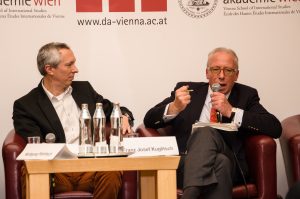
With enough political will, argues Ambassador Kuglitsch, nuclear weapons could be eliminated rather quickly:
“At the height of the Cold War, there were 60,000 warheads around, now it’s down to 15,400.”
As negotiations will start in March, questions arise as to the scope the treaty should have. Verification for instance should come at a later stage, argues Tariq Rauf:
“otherwise we will be discussing this until the end of this century”.
The role of civil society
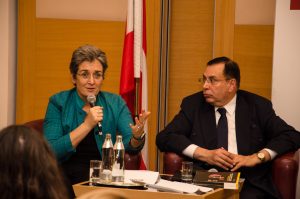 Ahead of and in parallel to the negotiations, civil society has a major role to play in changing the game:
Ahead of and in parallel to the negotiations, civil society has a major role to play in changing the game:
“Without pressure from civil society, the Cluster Munitions Convention would never have materialised”,
claims Ulrike Lunacek, Vice-President of the European Parliament. Together with parliamentarians and elected representatives, campaigners must continue to pressure governments to actively support negotiations. On the European level, the European Parliament’s recent resolution calling on EU Member States to participate in the negotiations was a major breakthrough in this regard.
End of the nuclear era in sight?
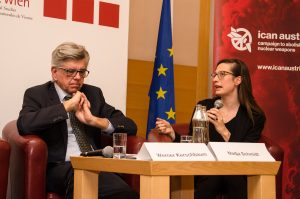 The discussants are overall optimistic about getting closer to an end of the nuclear era. Referring to former US President Obama’s famous Prague speech in 2009, ICAN Austria’s Director Nadja Schmidt says
The discussants are overall optimistic about getting closer to an end of the nuclear era. Referring to former US President Obama’s famous Prague speech in 2009, ICAN Austria’s Director Nadja Schmidt says
“Maybe not in Obama’s lifetime. But I am optimistic it will happen in my lifetime.”
Beyond putting an end to the looming threat of nuclear weapons, Wolfgang Petritsch sees in the humanitarian initiative an opportunity to rethink nowadays’ concept of security:
“The bigger task in the longer term is really addressing the issues in a broader context. When we talk about security policy, we need to think more in terms of peace and not in terms of war as the end goal”.
The event in figures:
- 180 participants including members of the diplomatic community, academia, scientists, civil society and students attended the discussion at the Diplomatic Academy in Vienna
- additionally, the Facebook Live Stream hit 586 Views and was shared 17 times, reaching a total of 2400 people in social media
- 19 questions from the audience both in the room and on social media steered the discussion, of which 14 were answered by the experts
Links:
- Read more about the Ban Treaty on nuclearban.org
- Read more about the Resolution in the European Parliament
- See our Event-page „Towards Banning Nuclear Weapons in 2017: Changing the game in nuclear disarmament?“
- Find more pictures of the event on our Facebook page
- Watch the recording of the discussion on YouTube
ICAN Austria wants to warmly thank its co-organizers, partners and donors that helped realizing this event.
A COOPERATION OF
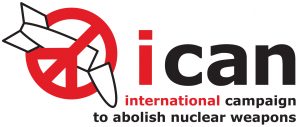
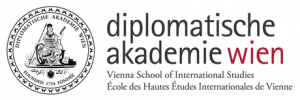

SUPPORTED BY
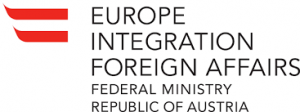
PARTNERS
